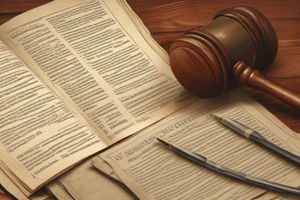Podcast
Questions and Answers
Welches Gesetz verbietet Diskriminierung auf der Grundlage von Geschlecht, Rasse und Behinderung in Bildungseinrichtungen?
Welches Gesetz verbietet Diskriminierung auf der Grundlage von Geschlecht, Rasse und Behinderung in Bildungseinrichtungen?
- Gesetz über Datenschutz
- Gesetz gegen Umweltverschmutzung
- Gesetz über Steuern
- Bildungsgesetz (correct)
Welche These könnte den Inhalt von Bildungsgesetzen kritisch beeinflussen, indem sie Geschlechterstereotype verstärkt und ungleichen Zugang zur Bildung fördert?
Welche These könnte den Inhalt von Bildungsgesetzen kritisch beeinflussen, indem sie Geschlechterstereotype verstärkt und ungleichen Zugang zur Bildung fördert?
- Wahrung der Religionsfreiheit
- Datenschutzrichtlinien
- Schutz vor Gewalt und Belästigung
- Trennung von Jungen und Mädchen in Schulen (correct)
Welche Schülergruppe sieht sich häufig mit Hindernissen konfrontiert, die den Zugang zur Bildung beeinträchtigen und zu hohen Abbruchquoten führen können?
Welche Schülergruppe sieht sich häufig mit Hindernissen konfrontiert, die den Zugang zur Bildung beeinträchtigen und zu hohen Abbruchquoten führen können?
- Kunststudenten
- Schwangere und alleinerziehende Schüler (correct)
- Wintersportler
- Schüler mit technischen Fähigkeiten
Welche Art von Richtlinien regeln, wie Schüler auf dem Schulgelände auf digitale Geräte zugreifen und diese nutzen können?
Welche Art von Richtlinien regeln, wie Schüler auf dem Schulgelände auf digitale Geräte zugreifen und diese nutzen können?
Welche Art von Richtlinien legt fest, wie Schulen mit Geschlechtsbasierte Gewalt und Belästigung umgehen müssen, um eine sichere Lernumgebung zu gewährleisten?
Welche Art von Richtlinien legt fest, wie Schulen mit Geschlechtsbasierte Gewalt und Belästigung umgehen müssen, um eine sichere Lernumgebung zu gewährleisten?
Was ist der Hauptgegenstand des Bildungsrechts?
Was ist der Hauptgegenstand des Bildungsrechts?
Welches Gesetz gewährleistet das Recht von Schülern auf eine Bildung ohne Geschlechterdiskriminierung?
Welches Gesetz gewährleistet das Recht von Schülern auf eine Bildung ohne Geschlechterdiskriminierung?
Welche Pflichten werden durch das Bildungsrecht für Lehrer und Schulpersonal festgelegt?
Welche Pflichten werden durch das Bildungsrecht für Lehrer und Schulpersonal festgelegt?
Welches Gesetz schützt die Vertraulichkeit von akademischen Aufzeichnungen und der Informationen der Schüler?
Welches Gesetz schützt die Vertraulichkeit von akademischen Aufzeichnungen und der Informationen der Schüler?
Wer ist für die Durchsetzung von disziplinarischen Maßnahmen in Bildungseinrichtungen verantwortlich?
Wer ist für die Durchsetzung von disziplinarischen Maßnahmen in Bildungseinrichtungen verantwortlich?
Flashcards are hidden until you start studying
Study Notes
Education Law and School Policies
Education law is a broad field that encompasses various aspects of legal regulations and policies governing educational institutions and students. This article focuses on the subtopics of education law and school policies, highlighting their significance and the challenges they pose.
Education Law
Education law involves the regulation of educational institutions and the rights of students, teachers, and school administrators. It is a complex and multifaceted area of law that covers a wide range of issues, including:
- Student Rights: Education law ensures that students have specific rights, such as the right to an education free from sex discrimination (Title IX) and the right to privacy (Family Educational Rights and Privacy Act).
- Teacher and Staff Responsibilities: This area of law defines the responsibilities of teachers and staff in educational institutions, including their duties related to academic instruction, student discipline, and school safety.
- Disciplinary Procedures: Education law outlines the procedures schools must follow when disciplining students, ensuring that these procedures are fair and effective.
- School Safety: Laws governing school safety address issues such as bullying, harassment, and violence in educational settings, aiming to provide a safe and secure learning environment.
- Harassment and Discrimination: Education law prohibits discrimination on various grounds, including sex, race, and disability, and requires schools to have policies in place to address harassment and discrimination.
- Funding: Education law also covers the funding of educational institutions and students, ensuring that they receive adequate resources to provide quality education.
School Policies
School policies are the guidelines and rules set by educational institutions to govern student behavior, academic standards, and other aspects of school life. Some of the key policies include:
- Dress Codes: Dress codes establish guidelines for appropriate student attire, ensuring that students maintain a certain standard of dress.
- Technology Use: Policies related to technology use in schools regulate how students can access and use digital devices, such as smartphones or laptops, on school property.
- Student Privacy: School policies address privacy concerns, such as the collection, use, and protection of student data.
- Religious Expression: Policies on religious expression in public schools dictate the extent to which students can express their religious beliefs and practices in school settings.
- Discipline and Suspension: School policies outline the procedures for disciplining students, including the use of suspensions, expulsions, and alternative disciplinary measures.
- Special Education: Policies for special education students ensure that these students receive appropriate accommodations and services to enable them to meet their educational goals.
Challenges and Issues
Education law and school policies face various challenges and issues, such as:
- Gender Equality: The trend of separating boys and girls in public schools based on sex stereotypes can perpetuate sexist and racist conceptions, leading to unequal access to education.
- Pregnant and Parenting Students: These students often face significant obstacles in accessing education, leading to high dropout rates. Schools often fail to provide necessary support, perpetuating sexist and often racist stereotypes about sexually active young women.
- Gender-Based Violence and Harassment: Schools must address these issues effectively through policies and responses to ensure that students can learn in safe environments.
Conclusion
Education law and school policies play a crucial role in shaping the educational experience for students. By understanding these laws and policies, we can work to ensure that schools provide a safe, inclusive, and equitable learning environment for all students.
Studying That Suits You
Use AI to generate personalized quizzes and flashcards to suit your learning preferences.




